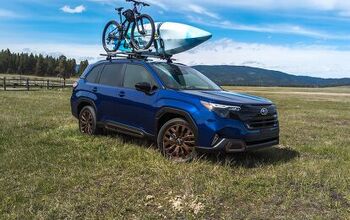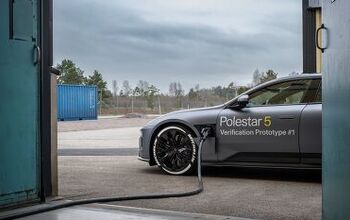Hyundai, Tesla In Spat Over Funding Of Supercharger Network
Hyundai’s head of U.S. product planning Michael O’Brien may have written a check his mouth can’t cash when he claimed Tesla’s Supercharger network was paid with taxpayer dollars.
Green Car Reports says during a discussion of his employer’s view on hydrogen fueling infrastructure, O’Brien stated that Hyundai has not received any funding from the federal government for its hydrogen vehicles, while Tesla’s Supercharger network was paid with “grants and loans from the government.”
In turn, this assertion infuriated Tesla’s vice president of business development Diarmuld O’Connell:
Those sites have been paid for entirely by Tesla Motors — which continues to spend money in expanding the network. This stands in stark contrast to certain foreign carmakers, including Hyundai, who have no manufacturing presence in California but expect the state’s taxpayers to spend up to $200 million to set up hydrogen stations.
For his part, O’Brien did acknowledge hydrogen would only take off “when other states start investing in infrastructure.”
Seattle-based writer, blogger, and photographer for many a publication. Born in Louisville. Raised in Kansas. Where I lay my head is home.
More by Cameron Aubernon

































Comments
Join the conversation
Samsung trashing Apple, now Hyundai trashing Tesla. Why are these foreign companies treading on genuinely American companies and why are we letting them by buying their products? Boycott Korea!!!
I'll keep this short but unless the government willfully builds either electric or hydrogen infrastructure it won't be built. Call it what you will but the market is monopolistic and gas companies have no reason to reinvest in a new technology that would cut into their profitable monopoly. Especially as neither of the alternative power sources would or could be controlled by their system (desalination plants are primed to crack water, electricity from various sources).
Marcelo, On Verizon, yes the US government is deeply involved in the mobile telephony business, but I think that at the end of the day, it was Verizon that decided to build the network, they invested billions of dollars, and they are reaping the benefits. I think most people would concede that it was an infrastructure investment led by a corporation, rather than the government. On Starbucks, I wondered the same question as I wrote that. I chose Starbucks vs. most restaurant chains because Starbucks actually owns their stores - they don't franchise in the US. And when you think about it, a coffee shop is similar to a gas station: lots of locations nationally, long supply chain, similar business continuity and product quality risks, etc. I am definitely open to other examples and continuing the dialog - I don't have all the answers by any means. But my hypothesis is that there is very little appetite among the majority of Americans for the federal government to develop new types of infrastructure. If it is going to happen, visionary corporations will need to lead.
yeah, 'cause there's so much war we could spend our money on ...